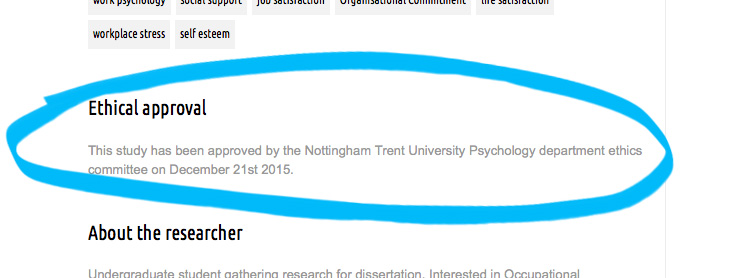Participants 101 - Part 3 - Ethics
17 February 2016
This time on Participants 101 we are going a bit deeper into understanding academic research and looking at the role of ethics and what it means to conduct ethical research, as well as ethics approval procedure. This gets you inside the mind of the researcher to understand their concerns and helps you be safe when taking part in research.
Why is ethics a big deal?
In the past researchers have been known to conduct experiments with little regard for the well-being of their participants. For example, 'Elephants on Acid: and Other Bizarre Experiments' by Alex Boese covers a range of such studies, and makes for a very interesting read. You've probably heard of Pavlov's dogs, head transplant studies, or perhaps Milgram's 1963 electric shock experiments. Today’s academic community places far more stringent rules on what can and can’t be done in the name of science, adding a level of protection for those who agree to take part in studies. Research on humans or other sentient beings undertaken at universities must generally be reviewed by an ethics committee. This means that the research is looked over by at least two senior academic staff members, who are not directly involved in the research. They try to identify any problematic areas about conducting the research and make sure everything is done "by the book". Ethics review boards take into account a range of factors when making decisions, including the age and mental state of the participant target population, risks involved, use of deception, language barriers, and methods of recruitment. Most of it really is just common sense, but each university tends to have their own policies to what is looked at.
What is ethics?
That’s all very well, but what exactly makes research ethical? Stating that the researcher will be nice to participants is a great first step, but it won’t quite cut it under the scrutiny of an ethics committee.
If you’ve ever taken an ethics class or come to contact with the term before, you’ve probably come across informed consent. This umbrella term includes ensuring that participants understand the purpose of the study, any risks they’re taking by participating, and their right to withdraw at any point. You should be made aware of the length of time you’ll spend on the study, as well as being given contact information should you have any questions or concerns afterwards.
What does this mean day-to-day?
When taking part in research, you’ll often hand over personal information to the researcher, which makes it the researcher's responsibility that it's dealt with in a suitable fashion. Confidentiality is key here – we recommend that researchers give you anonymity as soon after data collection as possible. It should go without saying that they should never use the gathered information for anything other than the research it was collected for.
Researchers also have a duty of care to their participants; they have to ensure that they don’t cause you any harm, either physically or psychologically. While some studies involve tackling these issues head-on - for example pain tolerance studies can not be conducted without subjecting participants to some pain - causing you undue stress is considered unethical and the researcher needs to inform you of any stress you may experience while taking part.
We place high importance on these factors and you can be assured that all researchers on Call for Participants have acknowledged and accepted this responsibility before their study is publicly visible on the site.
How can I make sure the research I take part in is ethical?
At Call for Participants, we make it easy for researchers to tell you about the ethics comittee approvals that the study has received. Simply look out for it on the study page.

Ethics information shown on a CFP study page
If, however, you can't find the info, that doesn't yet mean that the study is unethical or that you are in danger. Some questionnaires or other more 'straightforward' studies don't need ethics comittee approval, and as mentioned above, the rules for this vary between universities. If you are in doubt, the easiest thing you can do is ask the researcher using our contact feature (See here).
So now that you are equipped with new knowledge, why not put it to use and find some studies to take part in:
